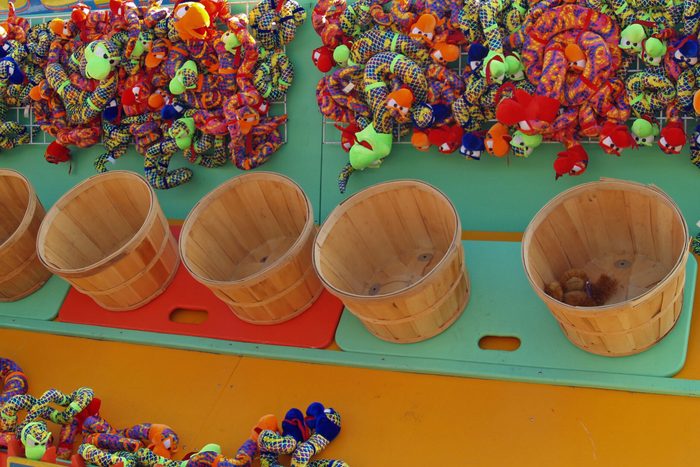These rigged carnival games are engineered to mess with your brain, your aim and your wallet. But with a little insider knowledge, you just might win that giant frog.

Here’s How Your Favorite Carnival Games Are Rigged—And Tricks to Beat the System


Ring Toss
Odds of winning: 2/10
On paper, it’s simple: Toss a ring onto a glass bottleneck. In reality? It’s like trying to thread a needle while skydiving. The rings are just barely wider than the bottle tops, and they bounce like they’re made of trampoline. “This one is really all luck,” according to the anonymous carnival worker on Reddit. But Li says there’s a little bit more to this rigged carnival game than that: “The key is the bounce. Rings are lightweight and tend to ricochet unless you toss them with spin and a soft arc.”
Cooper adds that having the bottles packed tightly together also increases the illusion of success while making it harder to get a clear shot.
How to win: “Throw one ring at a time like a Frisbee. Throw it at a steep arc so that it lands in the middle of a close group of bottles,” the carnival worker says. “It needs to bounce in order to stay on the bottle because the ring will always have too much potential energy to stay.”
And don’t even think about hucking them like ninja stars. “Make sure you’re following all the rules,” the worker adds, “because if it’s a big prize, they will try to find a reason to disqualify it.”

Basketball Shoot
Odds of winning: 4/10
Even if you were the best free-throw shot on your varsity team, this isn’t your high school gym setup. The rim is oval, the net is stiff, and the ball is pumped up like it’s auditioning for a CrossFit competition. And sometimes there’s a wide lip at the front edge of the rim designed to bounce the ball out. “Even the trajectory is off,” Cooper explains. “The hoop is often higher and farther back than it looks.”
However, this is by far the most common skill game you will see, according to the carnival worker, and it is very simple to play. “Also, this game has the highest win/reward ratio,” they add.
How to win: Use a high arc shot or a bank shot (if they’re allowed). Skip the swish; the backboard is your friend. And be on the lookout for prizes hanging from the ceiling. If a plush minion is hanging over the hoop, it’s not decoration—it’s a shot blocker.

Balloon Darts
Odds of winning: 6/10
Popping a balloon sounds easy—unless the dart is duller than your cousin’s crypto pitch and the balloons are half-deflated. “The instant ‘pop’ is a dopamine hit,” says Li. “But those balloons are often made from thicker rubber and inflated just enough to taunt you.”
How to win: Go for the tautest, roundest balloons, and avoid the small or squishy ones, according to Connor. Another important tip from the carnival worker: Aim for the balloons on the outer edge. Why? They often put the good prizes there “because almost everyone just spams the center of the board with darts instead of aiming.”
And if the worker starts heckling you? That’s a clear sign that you’re aiming at the right balloon. Pro tip: Bring a friend to run distraction.

Rope-Ladder Climb
Odds of winning: 3/10
You’ve seen it: a tilted rope ladder, a bell at the top, and a line of people falling off, dramatically flipping head over tail like gymnastic pancakes. It looks simple—until you move one pinky toe and spiral into the abyss. This is because the rope is designed to be very unstable, even if it doesn’t look like it.
“Balance is everything,” the carnival worker says. “The trick is moving the opposite hand and foot in sync, with your weight centered.” And don’t be afraid to take your time to strategically test your foot or hand placement. That said, the angle of the ladder makes it hard to hang on for too long, so you’ll have to balance speed with caution.
How to win: Keep your weight distributed evenly between one hand and the opposite foot. Lean forward. Move slowly and smoothly. And watch closely when they demo it for you—they’re giving you the cheat code of exactly where to put your weight.

Milk-Bottle Knockdown
Odds of winning: 3/10
Three bottles. Three balls. Just knock one over. Easy, right? Not if the bottles are weighted, magnetized and/or stacked tightly together like a Jenga tower from hell. And even though the bottles may all look the same, they’re often not, with the ones closest to you being the heaviest and the hardest to knock over. The same goes for the bottle on top. Most people assume the top bottle will be the easiest to topple, based on how we normally build towers of objects, but again, this one will likely be heavier than the rest.
Overall, “those bottles are designed to absorb force,” Cooper says. “So your throw has to be both accurate and powerful.”
How to win: Aim for the middle or base of the stack, not the top. And channel your inner fast-pitch softball star. Sorry, underhand tossers, force is everything if you want to win one of these rigged carnival games.

Guess Your Weight, Age or Birthday
Odds of winning: 5/10
My college roommate was a carnival worker, and this was the game she ran—and she was insanely good at it. While you think you’re just standing there nervously while someone guesses your age based on your hoodie, your playlist and your visible despair, they’re actually using some very smart tricks.
“It’s cold reading combined with statistical averages,” explains Li. For instance, far more babies are born in July, August and September, so guessing your birth month isn’t a 1-in-12 shot—it’s weighted. Operators also listen for conversational clues and scan for visual giveaways, like tan lines, braces, jewelry, car keys or the general aura of someone who once tried to return an iced coffee in a drive-thru. And the more seasoned the carny, the sharper their sixth sense. My roommate had so much practice, she could guess anyone’s weight within 10 pounds just by looking at them. (Which, for the record, is not the most comforting trait in a college roommate.)
And here’s the kicker: Li says many booths build in a generous margin of error. My roommate? She just had to guess the season of someone’s birthday—a 1-in-4 chance. She crushed it.
How to win: Don’t talk. Don’t smile. Don’t give them anything. Stone-face your way to a stuffed banana. And hope you get a newbie.

Bottle Up
Odds of winning: 7/10
This game looks like a physics lesson gone rogue: Use a stick with a loop to lift a beer bottle upright. Sounds easy. It’s not. The platform tilts toward you, and the bottle loves to roll off like it’s being paid to. However, “this is probably the easiest for a person off the street to win … as long as you know the trick,” the carnival worker says.
How to win: The trick? Place the ring just below the bottle lip, pull the rope tight, then lift at a 15-degree angle while pushing forward slightly. Once the bottle is upright, let the ring fall to the bottom of the neck to help stabilize it. And remember: Just because it looks straight doesn’t mean it’s stable—thanks, tilted platform! It’s less about strength, more about finesse. Think: sword fighting with a cooked spaghetti noodle.

Bank a Ball (Tub Toss)
Odds of winning: 1/10
How to win: Hit the sweet spot under the rim lip so it gently slides down into the tub, or go for a gentle, spinning arc. Or just keep your $5 and watch someone else spiral into despair. The carnival worker adds that sometimes you can bounce it off the rim, but check first for a very small sign that reads “no rim shots.” (There’s almost always a sign.)

Duck Pond
Odds of winning: 9/10 (but don’t get too excited)
The Duck Pond is the soothing oasis in a sea of rigged carnival games. All you have to do is pick a duck. Each duck may have a number or symbol on the bottom, correlating to different prize tiers. It’s usually the first game kids play and the only one where you’re guaranteed to win something. The catch? That “something” is usually a plastic whistle, which your kid will love and will make your ears bleed during the car ride home. (Ask me how I know.)
Only a few ducks are connected to anything remotely exciting, and the rest are just there to float and disappoint. “This is a game of pure chance,” says Li. “It’s designed for younger children and guarantees a low-value prize to keep them happy.” It’s basically the participation trophy of carnival games—which, to be fair, kids love.
How to win: Honestly? You already did, by keeping your child happy for 90 seconds.

Strongman (Punching Bag or Sledgehammer)
Odds of winning: 3/10
Nothing stokes the male ego like a game that challenges your raw power in front of strangers. Whether it’s the punching bag or the classic “swing the hammer, hit the bell” setup, Strongman games promise you glory … and then they calibrate the machine so you leave humbled and $5 poorer. This was the other game my roommate ran, and she said she rarely saw anyone win it.
“These machines are often set to require way more force than you’d expect,” says Cooper. “It’s not just about strength; it’s also about precise technique.” That’s right: Even your deadlifts and creatine can’t save you if you miss the timing or the precise hit location. Even worse, your friend who skips leg day every week will somehow score higher just because they watched a YouTube tutorial the night before.
How to win: For sledgehammer games, focus on a fast but controlled swing that hits dead center on the pad. Drop your hips as soon as the hammer hits, to add your weight to the force. With punching bags, speed and accuracy matter more than brute strength. (Also: Maybe stretch first. You’re not 20 anymore.)
About the experts
|
Why trust us
At Reader’s Digest, we’re committed to producing high-quality content by writers with expertise and experience in their field in consultation with relevant, qualified experts. We rely on reputable primary sources, including government and professional organizations and academic institutions as well as our writers’ personal experiences where appropriate. For this story on rigged carnival games, Charlotte Hilton Andersen tapped her experience as a longtime journalist who often covers common curiosities, fun facts and psychology for Reader’s Digest. We verify all facts and data, back them with credible sourcing and revisit them over time to ensure they remain accurate and up to date. Read more about our team, our contributors and our editorial policies.
Sources:
- Colin Cooper, human-behavior analyst, former game designer, game-theory teacher and co-founder of IlluminateXR; phone interview, July 5, 2025
- Weirong Li, Forbes “30 Under 30” honoree, expert in emotional intelligence and human behavior, and founder and CEO of Raw Culture; email interview, July 5, 2025
- Reddit: “IAmA carnival game worker AMA”

















